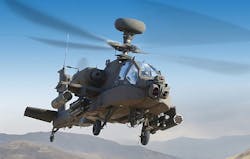Boeing to build 17 new and rebuilt AH-64E Apache Guardian attack helicopters and avionics for UAE
Officials of the Army Contracting Command at Redstone Arsenal, Ala., are asking the Boeing Defense, Space & Security segment in Mesa, Ariz., to provide nine new and eight rebuilt AH-64E helicopters.
The AH-64 Apache is a multirole combat helicopter with integrated avionics and weapons, as well as advanced digital communications to enable real-time, secure transfer of battlefield information to air and ground forces.
The AH-64E Apache Guardian features enhanced performance, joint digital operability, improved survivability and cognitive decision aiding, and reduced operating and support costs, Boeing officials say. The AH-64E Apache, is being delivered to the U.S. Army and has been selected by several international defense forces.
The AH-64E Longbow remanufacture effort upgrades existing AH-64 Apaches to the AH-64E Apache Longbow Block IIIA configuration. It involves the Northrop Grumman AN/APG-78 millimeter wave fire-control radar, radar frequency interferometer, fire-and-forget radar-guided Hellfire missile capability, and cockpit management and digitization enhancements.
The combination of the fire-control radar, radar frequency interferometer, and the advanced navigation and avionics suite provides increased situational awareness, lethality, and survivability, Army officials say.
This program also installs the Lockheed Martin Apache Arrowhead Modernized Target Acquisition Designation Sight (M-TADS) and Pilot Night Vision Sensors (PNVS) systems aboard remanufactured AH-64E helicopters.
Formerly known as AH-64D Block III, the AH-64E Guardian has improved digital connectivity, the joint tactical radio system (JTRS), more powerful T700-GE-701D engines with upgraded transmission to accommodate more power, capability to control unmanned aerial vehicles (UAVs), new composite rotor blades, instrument flight rules (IFR) capability, and improved landing gear.
The AH-64E is designed for armed reconnaissance, close combat, mobile strike, and vertical maneuver missions in day, night, obscured-battlefield, and adverse-weather conditions. The helicopter has self-diagnostic abilities, Link-16 data linking, and updated Longbow radar with oversea capacity that could enable naval strikes.
Versions of the AH-64 Apache attack helicopter have been in service with the U.S. Army since 1986. It is a four-blade, twin-engine attack helicopter with a tandem cockpit for a two-man crew.
Related: Army to make AH-64E Apache attack helicopter more capable at sea and deadlier overall
It has a nose-mounted sensor suite for target acquisition and night vision systems. It is armed with a 30-millimeter M230 Chain Gun carried between the main landing gear, under the aircraft's forward fuselage.
The attack helicopter has four hardpoints mounted on stub-wing pylons, typically carrying a mixture of AGM-114 Hellfire missiles and rockets. The helicopter was designed to replace the Bell AH-1 Cobra as the Army's primary attack helicopter. The U.S. Marine Corps still operates late-model versions of the AH-1 Cobra.
Boeing began deliveries of the AH-64E model in October 2011. Seven customers outside the U.S. have ordered this variant. Including this latest version, the U.S. and 15 other countries have used the Apache during the past three decades.
On this order Boeing will do the work in Mesa, Ariz., and should be finished by February 2023. For more information contact Boeing Defense, Space & Security online at www.boeing.com/defense/ah-64-apache, or the Army Contracting Command at Redstone Arsenal at http://acc.army.mil/contractingcenters/acc-rsa.
Ready to make a purchase? Search the Military & Aerospace Electronics Buyer's Guide for companies, new products, press releases, and videos

